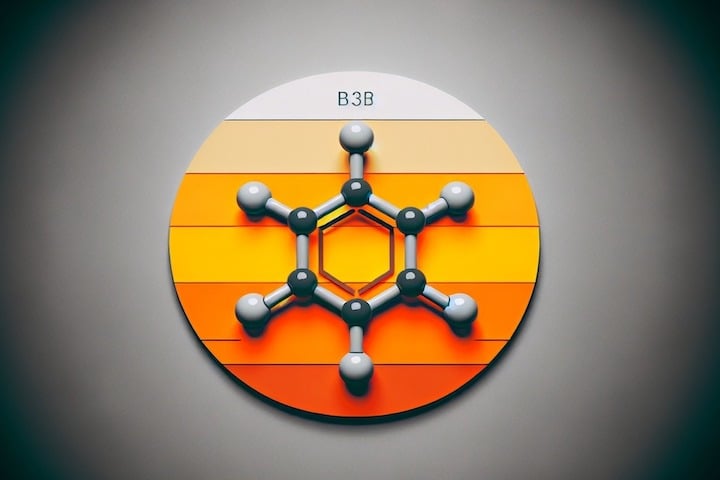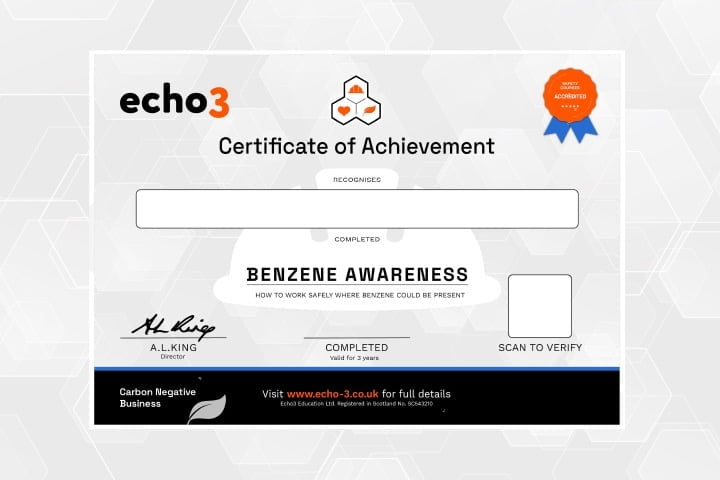Benzene Awareness Course
 Online Benzene Awareness Course covering the safe handling, health hazards, and regulatory compliance associated with benzene exposure in various industries.
Online Benzene Awareness Course covering the safe handling, health hazards, and regulatory compliance associated with benzene exposure in various industries.
Benzene is a hazardous substance. Workplace hazards associated with Benzene include an increased risk of leukemia, anemia, and other blood disorders. It is a known carcinogen and can be harmful when inhaled or absorbed through the skin. Benzene is also highlight flammable making proper handling and safety measures critical for worker protection.
By the end of the course, learners will be equipped with the knowledge necessary to protect themselves and their colleagues from benzene exposure in the workplace, fostering a safer and more informed work environment.
A record of completed training will be kept to employers can demonstrate compliance.
Benzene Awareness Course Content

- What is Benzene?
- Where is Benzene found?
- What are the effects of Benzene on the environment?
- What are the effects of Benzene exposure?
- Safety equipment that will protect staff from Benzene
- Ways to reduce the risk from Benzene
- Written in compliance with the Control of Substances Hazardous to Health (COSHH) regulations
- Developed by qualified health and safety professionals Accredited by CPD – learn more about CPD here
- Last Updated October 2024
- To gain the certificate you must complete the assessment which involves 20 questions.
- You can access our LMS any time to reprint certificates, check and set pass marks and act as proof of a commitment to ongoing legal compliance.
- The online Benzene Awareness certificate is valid for 3 years.
Course Preview
Echo3 courses include engaging motion-graphic video content, with full english subtitles
Reviews
What are the Benzene course learning objectives?
 The learning objectives from the Echo3 online Benzene Awareness course are.
The learning objectives from the Echo3 online Benzene Awareness course are.
Understanding Benzene: understand of benzene, including its properties, sources, and chemical characteristics.
Health Hazards: Learn about the various health hazards associated with benzene exposure, such as leukemia, anemia, and blood disorders.
Regulatory Compliance: know the regulations related to benzene in the workplace.
Safe Handling and Storage, acquire knowledge on safe handling practices, storage procedures, and transportation regulations for benzene-containing materials.
Personal Protective Equipment (PPE), understand the use, and maintenance of PPE necessary for safeguarding against benzene exposure.
Ventilation and Engineering Controls, learn about effective ventilation and engineering control measures to minimise benzene concentration in the workplace.
Hazard Communication, understand the significance of hazard communication, labelling, and safety data sheets (SDS) related to benzene-containing substances.
Best Practice, acquire practical strategies and best practices for reducing benzene exposure, fostering a safer work environment while ensuring compliance with relevant regulations.
How can staff reduce the risk from Benzene?
When handling and working with Benzene staff should always follow their employers’ work processes because they will be designed for the specific hazards in your workplace.
These work practices will likely include;
- Always wearing the appropriate personal protective equipment (PPE)
- Informing your employer if PPE is warn or damaged because it must be replaced or fixed.
- Ventilation – Work in a well ventilated area
- Avoid open Flames and Sparks since benzene is highly flammable.
- Obviously don’t smoke where Benzene is stored, handled or used
- Store Benzene only using approved safety containers and ensure containers are always labelled correctly.
- Minimise skin contact with Benzene
- Wash hands thoroughly after working with Benzene
- Never engage in horseplay where benzene is used or stored.
What are the effects of Benzene Exposure?
If you are exposed to benzene, it can be hazardous to your health, so it is important to understand the types of exposure and impact.
Benzene can be absorbed into your body in three different ways: you can inhale it; you can absorb it through your skin; and you can ingest it.
If you ingest benzene in food or drink, you may feel a burning sensation in your digestive tract. You may also experience vomiting, tiredness, convulsions and a rapid or irregular heartbeat.
If you inhale benzene your lung tissue may be damaged. This can cause coughing, a hoarse voice and difficulty breathing. Exposure to large amounts can cause swelling of the airways and a build-up of fluid in the lungs.
If benzene comes into contact with your skin, it may cause redness, irritation and swelling, especially to the eyes and nose.
Duration of exposure will affect how your health is impacted.
If exposed to high concentrations, even once, you may experience headaches, tiredness, tremors or dizziness. If exposure is very high you may become unconscious or die.
If exposed to lower levels over a longer period, you may be at risk of bone marrow suppression, which affects the production of red blood cells. This can cause serious blood disorders such as Anemia. You may develop blood related cancers, such as Leukaemia or other cancers such lymphoma and multiple myeloma.
Benzene can weaken your immune system making you more susceptible to infections. Chronic exposure may affect the reproductive system. It can also cause cognitive impairment and changes in behaviour.
Remember, some of the symptoms may be delayed, so remain vigilant and, if in doubt, seek medical advice.
Where is Benzene found?
Benzene occurs naturally in crude oil, crude oil vapours, natural gas and some ground waters. It can also be released during natural processes such as volcanic eruptions and forest fires.
However, benzene in the general environment is mostly the result of human activity. Benzene can contaminate air, water and soil as a result of emissions, spills, or improper disposal practices. Car exhaust fumes are major contributors, along with petroleum manufacturing and other industries.
In an industrial setting, you may be exposed to benzene if you work within an oil refinery, chemical and petrochemical plants or coke works and foundries. You may also be exposed if you are involved in the storage and distribution of benzene.









